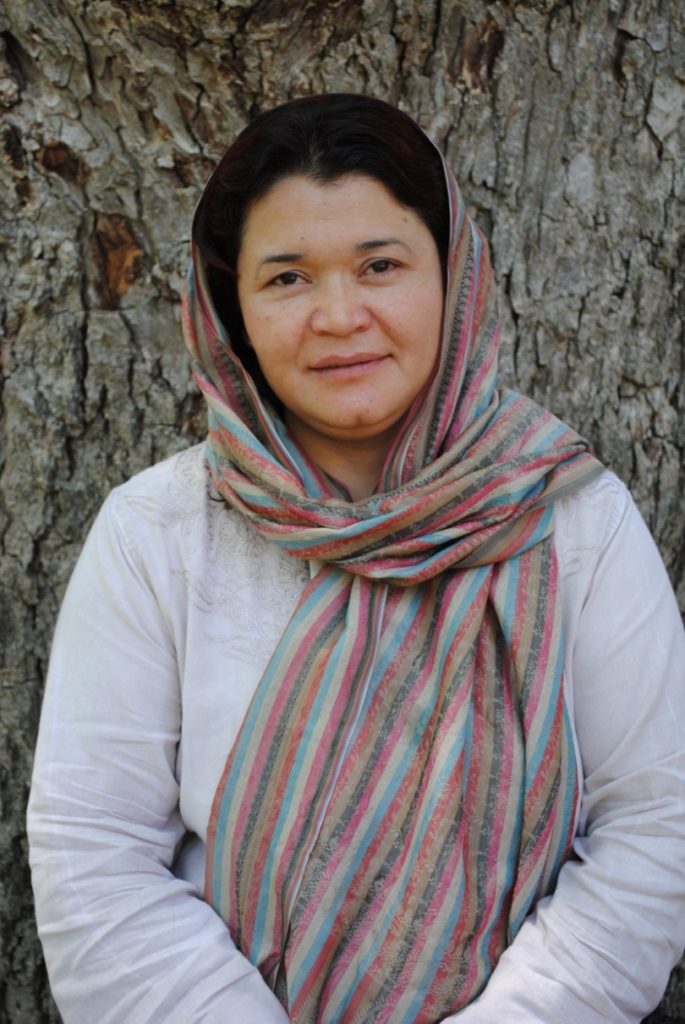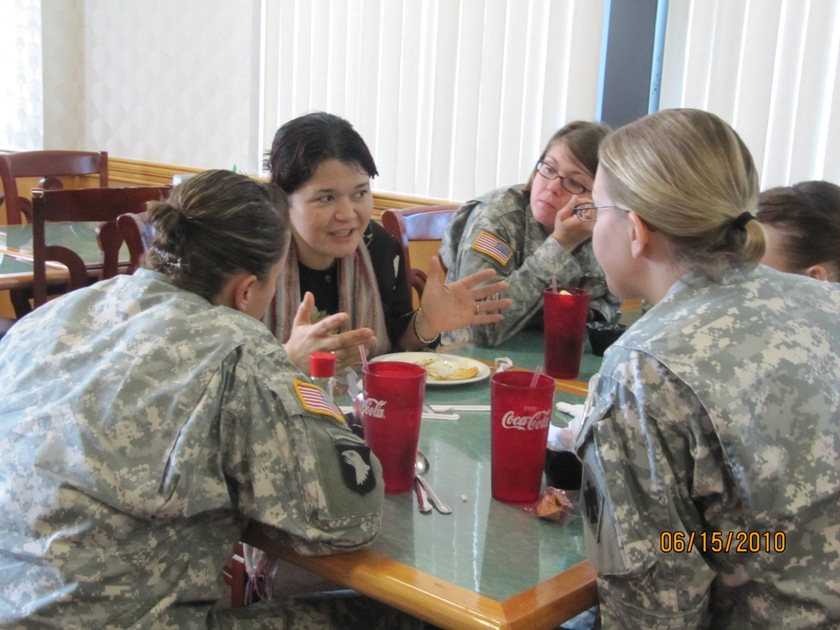
By Stacey Gualandi
If you have any doubt that women are making substantial gains in war-torn Afghanistan, look no further than Rahela Kaveer: wife, mother of four, doctor, entrepreneur, cowshed builder and Taliban target. She could put any Hollywood multi-hypenate to shame!
Dr. Kaveer is a one-woman success story who continues her devotion to advancing the lives of women in Afghanistan. Under Taliban rule, she not only escaped a hit list, but also went on to revamp a healthcare system outside Kabul. She became a UNICEF worker.
Last year, she ran for parliament. Today she helps teach women in rural areas cattle-raising training, among other things, through her own Afghanistan Women Empowerment Organization.

With a last-minute visa in hand, Dr. Kaveer visited the U.S. recently, but this was not just any social call. She was invited, alongside Dr. Terry Neese, founder of the Institute for Economic Empowerment of Women, to speak at a Dallas conference about the future of Afghan women.
Dr. Kaveer is a 2010 graduate of IEEW’S Peace Through Business program based in Oklahoma City, a special curriculum that offers long-term business training to women in Afghanistan and Rwanda.

The two doctors were in presidential company. The conference was hosted by George and Laura Bush at the George W. Bush Institute. They’ve both been proponents of women’s freedoms in Afghanistan since their days in the White House.
There are so many mixed messages coming out of Afghanistan on how women are faring that I was delighted to get the opportunity to hear first hand about this unique program and how it’s empowering women there. Both Drs. Kaveer and Neese shared with me how they are seeking peace through business.
EYE: How was the Dallas conference?
DR. NEESE: It was a huge success! It is great for former President Bush and Laura Bush to continue their fight toward freedom in Afghanistan. And to have Melanne Verveer, President Obama’s Global Ambassador-at-Large for Global Women’s Issues, at the conference to solidify the Obama Administration’s support is a great way to show bi-partisan support of an effort that is not partisan.
Listening to all of the speakers talk about progress that we don’t typically hear about in traditional media outlets is refreshing. We were able to inform so many people about the PEACE THROUGH BUSINESS program and the great work we are doing in Afghanistan and Rwanda.
EYE: How does IEEW’s program make it possible for someone like Dr. Kaveer to attend, graduate, and now prosper!?
DR. NEESE: Over 30 women take part in an 8-week training course in their own countries. The top 15 students from each country are then selected to participate in Leadership Development in the United States. In the U.S., they receive more intense entrepreneurship/business training, and spend one week with an American mentor.
“These women come from war-torn countries and are often only thinking of survival.” Dr. Neese
During mentorship, they are paired with a female business owner who practices their same trade in the U.S. They live and work with this mentor, so they get a full understanding of work-life challenges in the United States. The American women business owners say they learn more from the women than the women could possibly learn from them.
These women come from war-torn countries and are often only thinking of survival. We teach them to think forward and plan for their futures. They develop business and marketing plans, set long term goals, and are then trained to pay forward their knowledge to other female entrepreneurs in their communities.
“I was determined to do something for the women in Afghanistan.” Dr. Kaveer
EYE: Dr. Kaveer, you ran for the Parliament in 2010 in your country. What was that experience like for you?
DR. KAVEER: The 2010 Afghan Parliamentary election was the 2nd Parliamentary election after the fall of the Taliban. I was a candidate from Kabul province where a total of 120 women candidates were competing for seven seats. Although I was not a winner, my house to house campaign gave me the opportunity to see how women live in the suburb area of Kabul.
My education as MD, MPH, my 18 year background on women and health activity, and my PTB 2010 leadership skills, all encouraged me to participate in the Parliamentary election. My campaign brought me much closer to the realities of women’s daily lives, and I was determined to do something for the women in Afghanistan.

EYE: You are the founding director of the Afghan Women Empowerment Organization. Describe your success in Kabul.
DR. KAVEER: Since AWEO’S inception in 2009, as per its manifest, it has improved economic opportunities and access to education for women as a sustainable means of empowerment in the rural areas of Afghanistan. AWEO has established a fresh water fish farm mainly managed and operated by women in Beshood district of Maidan Wordak with a mobile health clinic in that area.
AWEO has started a computer literacy program for girls and a cattle farm for the introduction of improved breeds of cattle in Surkh Parsa district of Parwan province. The cattle farm will employ 10 women and impact 300 in the village.
“We have a successful model that can be replicated anywhere in the world.” Dr. Neese
EYE: How much resistance, if any, is there when it comes to Afghan women becoming entrepreneurs?
DR. NEESE: The larger challenges include literacy, language barriers, and travel constraints. According to the U.S. Department of State, only an estimated 21% of women in Afghanistan are literate, and it is even less than that in rural areas.
Many female business owners in Afghanistan operate businesses without the ability to read or write. Because the curriculum is in English and students are selected to work with American mentors, it is important for women to speak English.
“…doing business especially in the remote areas is a real matter of risk.” Dr. Kaveer
DR. KAVEER: Becoming a real entrepreneur for women in a male dominant society is a matter of courage or even sometimes risk. Much socio-political resistance occurs when a womean starts an independent business. Traditionally it’s viewed as a matter of shame for the whole family.
If a woman takes those steps, she faces a lot of hurdles in her acceptance as a business woman. Open communication with business partners, business traveling, contracting, and marketing are all full of resistance.
For myself, being a socio-political and women’s right’ activist, doing business especially in the remote areas is a real matter of risk. That is why I have to disguise myself while traveling to these areas.

EYE: We have profiled many women on The Women’s Eye who have a connection to Afghanistan. Author Gayle Lemmon sees an entrepreneurial spirit existing, while journalist Kim Barker told TWE that she was concerned that peace might come at the expense of women’s rights. What do you believe the future to be for women in Afghanistan?

DR. NEESE: Gayle Lemmon is familiar with our program and has written about PEACE THROUGH BUSINESS in a New York Times article. I believe the future of Afghanistan can be very bright for women. When given proper tools, the possibilities are endless. The Afghan women we educate learn to reach goals they never even knew existed.
We have a 23-year-old graduate who expanded her clothing store and now owns three. She is also attending medical school and volunteers with rural youth in Afghanistan.
DR. KAVEER: I think more women still need to be in the government and women need more support. It’s happening, but it’s not happening for all the women.
“We are empowering women! They are given resources to create their own success…” Dr. Neese
EYE: Will the advances made by women be threatened if the U.S. leaves?
DR. NEESE: There is a huge concern about the future of women’s rights when the U.S. begins to withdraw troops from the country. PEACE THROUGH BUSINESS helps ensure an ongoing and positive influence in Afghanistan. We are empowering women! They are given resources to create their own success instead of waiting for someone or another country to do it for them. And they are taught to take an active role in their government.
“…we, the women of Afghanistan, risk losing the achievement of ten years of struggle.” Dr. Kaveer
DR. KAVEER: All of us have noticed the scenes of beating, shooting, and stoning of women during the Taliban, or even today in the remote area of the country. With that type of political activity, the peace negotiations with Taliban, and the behavior/etiquette of peace-establishing authority (Peace Jirga), we, the women of Afghanistan, risk losing the achievement of ten years of struggle.
We can even expect a dark future similar to the Taliban era. We women really need longer international support, specifically from the U. S., for the normalization, civilization, and advancement of Afghan society.
EYE: What is the success rate of IEEW’s program? How many women have graduated and benefitted?
DR. NEESE: We have graduated over 100 women from our program in the four years of existence. All of the graduates are required to turn in quarterly reports documenting progress for one year after completion of the program.
We estimate that we have reached about 2,000 women with our pay-it-forward program. A 2007 graduate, Amir Taj Sirat, also ran for parliament and improved her soccer ball company’s revenues by 17%. Qandi Amaki, another graduate, is founder of the Balkh Women’s Business Association, which has more than 650 members. She has trained nearly 300 more to develop business plans and start micro businesses.

EYE: How does it feel to be affecting positive change in the future of Afghanistan?
DR NEESE: The change we are making in Afghanistan is unheard of. There is NO ONE in the world who is implementing a program like we are in Afghanistan. This is a country that has been at war for dozens of years. The infrastructure, business techniques, and education levels are all so very different.
It inspires the Afghan women to want to invoke positive change in their country and makes American business owners proud to live in America. I believe we’ll triple in the next five years what we did in the last 10 years.
“We have a successful model that can be replicated anywhere in the world.” Dr. Neese
EYE: Describe your goals for the future.
DR. KAVEER: I want a louder voice for women and for our work to be more fruitful. I expect this conference will bring stronger results for women’s freedom.
DR NEESE: Our future goals include translating our curriculum to Farsi, expanding to other provinces in Afghanistan, and also expanding to other countries. PEACE THROUGH BUSINESS is based on the principle that without a self-sustaining economy, peace will not exist. We have a successful model that can be replicated anywhere in the world.
EYE: Thank you both for your dedication, and we wish you continued success in all you do!




Leave a Reply